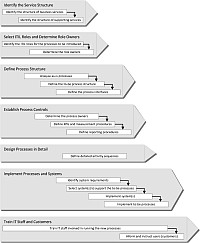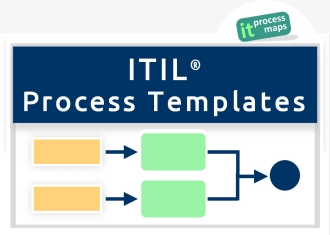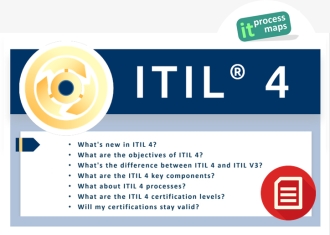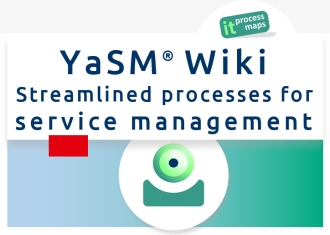ITIL Implementation: Difference between revisions
m Reverted edits by AcalgEttro (Talk); changed back to last version by WikiSysop |
mNo edit summary |
||
| Line 1: | Line 1: | ||
<seo metakeywords="itil implementation, implementation itil, itil project phases" metadescription="ITIL implementation projects are characterized by a typical course of action, independent of the size of the company and its core business." /> | |||
<imagemap> | |||
Image:ITIL-Wiki-de-es.jpg|DE - ES - ITIL Implementation - Implement ITIL|100px | |||
rect 0 0 50 30 [https://wiki.de.it-processmaps.com/index.php/ITIL-Implementierung diese Seite auf Deutsch] | |||
rect 50 0 100 30 [https://wiki.es.it-processmaps.com/index.php/Implementaci%C3%B3n_de_ITIL esta página en español] | |||
desc none | |||
</imagemap> | |||
<br style="clear:both;"/> | |||
__NOTOC__ | |||
ITIL implementation projects are characterized by a typical course of action, independent of the size of the company and its core business. This made it feasible to devise a time-tested project blueprint which can serve as a guideline for a wide range of ITIL initiatives. | |||
An ITIL | == ITIL Implementation in 10 Steps == | ||
An ITIL implementation project is structured in several phases, which each build upon the results of the previous project steps (see the [[ITIL Implementation#ITIL Implementation in 10 Steps - Project Course|Overview of the ITIL Implementation Project Steps]]). | |||
The work effort during the progress of an IT Service Management project is usually not distributed equally over the project course. The project begins with the definition of the processes and the organizational framework. In this case, it is possible to provide very concrete instructions, as this project phase allows itself to be extensively standardized. | |||
A larger work is usually involved for the IT organization during the actual implementation of the processes and systems. | |||
However, if the correct steps have already been taken during the conceptual phase of the ITIL project, it is decidedly easier to assign the available human and financial resources in an economical way. Contrary to this, if no well-designed conceptual phase takes place at the outset of the project, there is the risk of taking measures during the process and system implementation, which would prove expensive and disadvantageous for the business in the long-term; in this case, a reversion is hardly possible without further losses. | |||
<imagemap> | |||
Image:thumb-itil-project-course.jpg|left|10-step ITIL project course|200px|thumb | |||
default [https://wiki.en.it-processmaps.com/images/pdf/project_phases_itil_implementation_with_process_templates.pdf ITIL Implementation in 10 steps (.pdf)] | |||
desc bottom-left | |||
</imagemap> | |||
==== ITIL Implementation in 10 Steps - Project Course==== | |||
<br /> | |||
*[[ITIL Implementation - Project Preparation|Step 1: ITIL Project Preparation]] | |||
*[[ITIL Implementation - IT Service Structure|Step 2: Definition of the IT Service Structure]] | |||
*[[ITIL Implementation - ITIL Roles|Step 3: Selection of ITIL Roles and Role Owners]] | |||
*[[ITIL Implementation - ITIL Assessment|Step 4: Analysis of As-Is Processes: ITIL-Assessment]] | |||
*[[ITIL Implementation - Process Structure|Step 5: Definition of the To-Be Process Structure]] | |||
*[[ITIL Implementation - Process Interfaces|Step 6: Definition of Process Interfaces]] | |||
*[[ITIL Implementation - Process Controlling|Step 7: Establishing Process Control]] | |||
*[[ITIL Implementation - Process Design|Step 8: Designing the Processes in Detail]] | |||
*[[ITIL Implementation - Implementation|Step 9: Selection and Implementation of Application Systems]] | |||
*[[ITIL Implementation - Training|Step 10: ITIL Process Implementation and Training]] | |||
<br style="clear:both;"/> | |||
Our ITIL implementation guideline is designed to ensure that, after completion of the project, the [[ISO 20000#Central Requirements from ISO 20000|central requirements of the ISO 20000 standard]] are fulfilled. | |||
== ITIL Implementation with Process Templates == | |||
*[[ITIL Implementation with Process Templates|ITIL Implementation with Process Templates (ITIL Process Models)]] | |||
*[[Switching from ITIL V2 to ITIL V3]] | |||
== More on ITIL Implementation Projects == | |||
*[[ITIL for Small and Medium-Sized Businesses]] | *[[ITIL for Small and Medium-Sized Businesses]] | ||
*[[ITIL Introduction in Stages]] | *[[ITIL Introduction in Stages]] | ||
*[[ITIL Implementation - Key Factors|Key Factors for ITIL Implementations]] | *[[ITIL Implementation - Key Factors|Key Factors for ITIL Implementations]] | ||
<!-- This page is assigned to the following categories: --> | |||
[[Category:ITIL implementation|!]] | |||
<!-- --- --> | |||
Revision as of 19:27, 26 July 2011
<seo metakeywords="itil implementation, implementation itil, itil project phases" metadescription="ITIL implementation projects are characterized by a typical course of action, independent of the size of the company and its core business." />

ITIL implementation projects are characterized by a typical course of action, independent of the size of the company and its core business. This made it feasible to devise a time-tested project blueprint which can serve as a guideline for a wide range of ITIL initiatives.
ITIL Implementation in 10 Steps
An ITIL implementation project is structured in several phases, which each build upon the results of the previous project steps (see the Overview of the ITIL Implementation Project Steps).
The work effort during the progress of an IT Service Management project is usually not distributed equally over the project course. The project begins with the definition of the processes and the organizational framework. In this case, it is possible to provide very concrete instructions, as this project phase allows itself to be extensively standardized.
A larger work is usually involved for the IT organization during the actual implementation of the processes and systems.
However, if the correct steps have already been taken during the conceptual phase of the ITIL project, it is decidedly easier to assign the available human and financial resources in an economical way. Contrary to this, if no well-designed conceptual phase takes place at the outset of the project, there is the risk of taking measures during the process and system implementation, which would prove expensive and disadvantageous for the business in the long-term; in this case, a reversion is hardly possible without further losses.

ITIL Implementation in 10 Steps - Project Course
- Step 1: ITIL Project Preparation
- Step 2: Definition of the IT Service Structure
- Step 3: Selection of ITIL Roles and Role Owners
- Step 4: Analysis of As-Is Processes: ITIL-Assessment
- Step 5: Definition of the To-Be Process Structure
- Step 6: Definition of Process Interfaces
- Step 7: Establishing Process Control
- Step 8: Designing the Processes in Detail
- Step 9: Selection and Implementation of Application Systems
- Step 10: ITIL Process Implementation and Training
Our ITIL implementation guideline is designed to ensure that, after completion of the project, the central requirements of the ISO 20000 standard are fulfilled.






